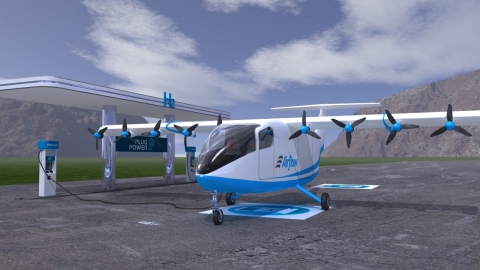Plug Power Invests in Airflow To Bring Hydrogen Fuel Cell Propulsion System to Part 23 Aircraft
Plug Power Invests in Airflow To Bring Hydrogen Fuel Cell Propulsion System to Part 23 Aircraft
Partnership marks the next phase of both companies’ pursuit of carbon-neutral aviation
SAN FRANCISCO--(BUSINESS WIRE)--Airflow, an aerospace company building a next-gen electric Short Takeoff and Landing (eSTOL) aircraft, today announced an investment from Plug Power Inc. (NASDAQ: PLUG), a leading provider of hydrogen engines and fueling solutions enabling e-mobility. Under this new partnership, the companies are co-developing and certifying a hydrogen fuel cell-based propulsion system designed for a new generation of sub-regional aircraft. Working with Airflow is part of Plug Power’s ongoing strategy to bring its proven hydrogen ProGen fuel cell technology to new markets including a variety of missions and aircraft types within the aerospace industry. This partnership also furthers Plug Power’s ambitions to build a hydrogen economy and achieve its 5-year, $1.2B roadmap outlined in 2019.
Airflow has recently secured over $600M in Letters of Intent (LOIs) from eleven airlines operating sub-regional aircraft. With an initial fleet replacement strategy, Airflow intends to accelerate bringing these carbon-neutral aircraft to market, offering airlines several options to match the best propulsion solution to their missions. This flexibility enables Airflow to rapidly meet customer demand and broaden the application of hydrogen as well as other carbon-neutral propulsion solutions including batteries and Sustainable Aviation Fuel hybrid solutions. Plug Power will also serve as Airflow’s preferred hydrogen provider, opening up more opportunities for Plug Power’s hydrogen refueling infrastructure to co-locate at customer airports. This work is an extension of Plug Power’s ongoing partnership with Albany International Airport where their hydrogen fuel cell solutions power ground support equipment.
Since partnering with other aerospace pioneers including Universal Hydrogen, Plug Power has embarked on a rigorous effort to adapt its ProGen-based hydrogen fuel cell stack specifically for aerospace applications. This technology enables the Airflow Model 200 aircraft to fly missions up to 500 miles with nine passengers or 2,000 pounds of cargo with zero carbon emissions.
As part of this program, Airflow and Plug Power will integrate and test a full-scale, ground-based powertrain prototype. Following this successful ground demonstration, the teams will then retrofit the powertrain into an aircraft with the ultimate goal of certification.
“Over the last several years we’ve been increasing our commitment to the aerospace market. From our investment in and partnership with Universal Hydrogen to our acquisition of EnergyOr we know that ensuring our ProGen solutions meet the ultralightweight and rigorous certification requirements of aviation is essential to our ownership of this opportunity,” says Plug Power CEO Andy Marsh. “Airflow represents another vital leg of the stool in our aerospace strategy. In order to establish a complete ecosystem for the aviation market and enable a global transportation system powered by green hydrogen, it’s essential that we work with players across aircraft classes who deeply understand the unique applicability of hydrogen in an industry as weight-sensitive as aviation. We see the development and certification of a system for Airflow’s Part 23 aircraft as an ideal entry point into the aerospace market that enables expansion into larger aircraft programs.”
“Plug Power is a welcome and natural partner in the clean aviation movement. Not only can they produce and supply affordable green hydrogen at scale, but they are at the forefront of supporting the experienced aerospace companies tackling the variety of missions and aircraft classes required to ensure our industry quickly improves its carbon footprint,” said Marc Ausman, CEO and co-founder, Airflow. “This initial investment from Plug Power is important to our ongoing development work at Airflow and we’re thrilled to have an industry leader in the hydrogen economy supporting our ambitious objectives. We see hydrogen fuel cell technology as a key thrust of our next generation power systems, which along with Sustainable Aviation Fuel-based hybrid systems and advanced battery systems, allow us to provide flexibility to our customers to deliver an aircraft that best meets their individual mission needs and sustainability goals.”
Plug Power is significantly growing its aerospace fuel cell system capabilities, in line with the Company’s vertical integration strategy. As part of this effort, Plug Power is expanding its ProGen platform for additional aerospace applications, including UAVs and aircraft with different weight restrictions and other unique requirements.
About Airflow
Airflow was founded in 2019 by five former Airbus Vahana team members to bring eSTOL capabilities to the sub-regional aviation market. The team is passionate about expanding aviation benefits and has deep experience in aerospace and technology development. The founding team's background includes companies like Airbus, Eclipse Aviation, Northrop Grumman, Uber Elevate, Airware, and Scaled Composites. For more information please visit: https://www.airflow.aero/
About Plug Power
Plug Power is building the hydrogen economy as the leading provider of comprehensive hydrogen fuel cell (HFC) turnkey solutions. The company’s innovative technology powers electric motors with hydrogen fuel cells amid an ongoing paradigm shift in the power, energy, and transportation industries to address climate change and energy security, while providing efficiency gains and meeting sustainability goals. Plug Power created the first commercially viable market for hydrogen fuel cell (HFC) technology. As a result, the company has deployed over 35,000 fuel cell systems for e-mobility, more than anyone else in the world, and has become the largest buyer of liquid hydrogen, having built and operated a hydrogen highway across North America. Plug Power delivers a significant value proposition to end-customers, including meaningful environmental benefits, efficiency gains, fast fueling, and lower operational costs. Plug Power’s vertically-integrated GenKey solution ties together all critical elements to power, fuel, and provide service to customers such as Amazon, BMW, The Southern Company, Carrefour, and Walmart. The company is now leveraging its know-how, modular product architecture and foundational customers to rapidly expand into other key markets including zero-emission on-road vehicles, robotics, and data centers.
Contacts
Media
Kate Gundry
airflow@pluckpr.com
617-797-5174

